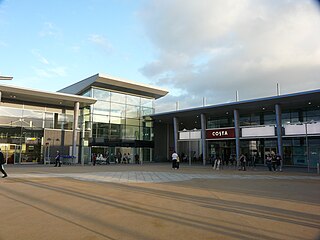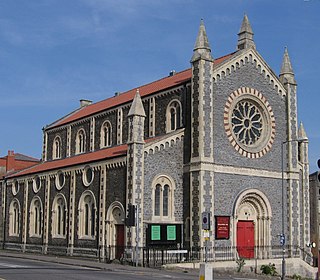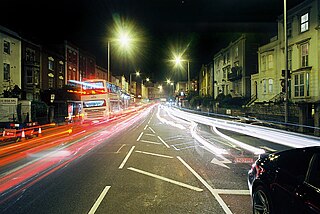Related Research Articles

Gloucestershire is a county in South West England. The county comprises part of the Cotswold Hills, part of the flat fertile valley of the River Severn, and the entire Forest of Dean.

South Gloucestershire is a unitary authority area in South West England. It comprises multiple suburban areas to the north and east of Bristol as well as a large rural hinterland. South Gloucestershire was created in 1996 from the northern section of the county of Avon, which was abolished at that time.

Bradley Stoke is a newly developed and planned town in South Gloucestershire, England, situated on the north side of the city of Bristol, 6 miles northeast of Bristol city centre and 103 miles (166 km) due west of London. Not far from the Severn Estuary of the Bristol Channel, Bradley Stoke is bordered by three motorways; the M5 to the north, the M4 to the east and the M32 to the south.
Patchway is a suburban town in South Gloucestershire, England, situated 10 km (6.2 mi) north-north west of central Bristol. The town is a housing overflow for Bristol being contiguous to Bristol's urban area, and is often regarded as a large outer suburb. Nearby are the other Bristol satellite towns of Filton and Bradley Stoke. Patchway is twinned with Clermont l'Herault, France, and Gauting, Germany. It was established as a civil parish in 1953, becoming separate from the parish of nearby Almondsbury.
The Birmingham and Gloucester Railway (B&GR) was the first name of the railway linking the cities in its name and of the company which pioneered and developed it; the line opened in stages in 1840, using a terminus at Camp Hill in Birmingham. It linked with the Bristol and Gloucester Railway in Gloucester, but at first that company's line was broad gauge, and Gloucester was a point of the necessary but inconvenient transhipment of goods and passengers onto 4 ft 8+1⁄2 in gauge that became the national standard. Nearly all of the original main line remains active as a "trunk" route, also known as an arterial route or line.

Gloucester railway station is a railway station serving the city of Gloucester in England. The station was originally built as the terminus of the Birmingham and Gloucester Railway in 1840, but the arrival of the Bristol and Gloucester Railway and Cheltenham and Great Western Union Railway in 1844, and then conversion to a through station for the South Wales Railway in 1851 resulted in a very complex layout. Subsequent closures and rationalization have left Gloucester with a station that is located off the main Bristol-Birmingham line, Meaning Great Western Railway services must reverse, while Cross-Country and Transport for Wales services continue to Newport.

South Gloucestershire and Stroud College, also known as SGS College, is a college of further education and higher education based in South Gloucestershire and Stroud, England. It was established in February 2012 following the merger of Filton College and Stroud College. The college is made up of six campuses located in and around Bristol, North Bristol, South Gloucestershire and Stroud.
The Bristol and Gloucester Railway was a railway company opened in 1844 to run services between Bristol and Gloucester. It was built on the 7 ftBrunel gauge, but it was acquired in 1845 by the 4 ft 8+1⁄2 instandard gauge Midland Railway, which also acquired the Birmingham and Gloucester Railway at the same time.

The Diocese of Bristol is an ecclesiastical jurisdiction or diocese of the Church of England in the Province of Canterbury, England. It is based in the city of Bristol and covers South Gloucestershire and parts of north Wiltshire, as far east as Swindon. The diocese is headed by the Bishop of Bristol and the Episcopal seat is located at the Cathedral Church of the Holy and Undivided Trinity, commonly known as Bristol Cathedral.

The City Road Baptist Church is a Baptist church on Upper York Street, Stokes Croft in Bristol, England.

Stokes Croft is a road in Bristol, England. It is part of the A38, a main road north of the city centre. Locals refer to the area around the road by the same name.

Gloucester Road is a road in Bristol, England. It runs through the suburbs of St. Andrew's, Bishopston and Horfield and is a part of the A38, a former coaching route north of Bristol to Filton and the M5 Motorway.
The A38 is a major trunk road running from the south-east of Bodmin in Cornwall to Mansfield in Nottinghamshire. At 292 miles (470 km), it is the longest 'A' road entirely within England.
Lindsay William Parsons was an English professional footballer who played in The Football League for Bristol Rovers and Torquay United.

Sir Richard Berkeley of Stoke Gifford, Gloucestershire was MP for Gloucestershire in 1604. He had previously served as Sheriff of Gloucestershire in 1564, and as Deputy Lieutenant of Gloucestershire. He was knighted by Queen Elizabeth I in 1568. In 1595 he was appointed Lieutenant of the Tower of London. In 1599 he was appointed custodian of Robert Devereux, 2nd Earl of Essex, who was kept under house arrest at Essex House in London. He died in 1604, whilst serving as MP, and was buried in The Gaunts Chapel, Bristol, where exists an effigy of him, which chapel had been founded in 1220 by Maurice de Gaunt, a member of the Berkeley family.

Stoke Gifford depot is a railway depot built for AT300 units from the Hitachi A-train procured under the Intercity Express Programme. The depot is situated between Filton and Stoke Gifford at a junction intersection of the Cross Country Route, South Wales Main Line and the Filton to Avonmouth Docks line. It is operated by Agility Trains as part of its contract to maintain the Class 800 fleet operated by Great Western Railway.
The 2018–19 season is Bristol City's 121st season as a professional football club and their fourth consecutive season back in the Championship. Along with competing in the Championship, the club will also participate in the FA Cup and EFL Cup. The season covers the period from 1 July 2018 to 30 June 2019.
The 2019–20 season was Bristol City's 122nd season as a professional football club and their fifth consecutive season in the Championship. Along with competing in the Championship, the club also participated in the FA Cup and the EFL Cup. The season covered the period from 1 July 2019 to 22 July 2020.
References
- ↑ "Mayors and Sheriffs of Bristol 1300 -1399". davenapier. Retrieved 5 July 2021.
- ↑ "The parliamentary history of the county of Gloucester, including the cities of Bristol and Gloucester, and the boroughs of Cheltenham, Cirencester, Stroud, and Tewkesbury, from the earliest times to the present day, 1213-1898"